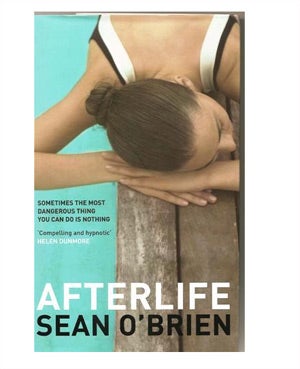Afterlife, By Sean O'Brien

Your support helps us to tell the story
From reproductive rights to climate change to Big Tech, The Independent is on the ground when the story is developing. Whether it's investigating the financials of Elon Musk's pro-Trump PAC or producing our latest documentary, 'The A Word', which shines a light on the American women fighting for reproductive rights, we know how important it is to parse out the facts from the messaging.
At such a critical moment in US history, we need reporters on the ground. Your donation allows us to keep sending journalists to speak to both sides of the story.
The Independent is trusted by Americans across the entire political spectrum. And unlike many other quality news outlets, we choose not to lock Americans out of our reporting and analysis with paywalls. We believe quality journalism should be available to everyone, paid for by those who can afford it.
Your support makes all the difference.Those who can, do: those who can't, wreck. Sean O'Brien's first novel scrutinises the workings of resentment, that under-acknowledged tide in the affairs of men and women, with moving intelligence. Afterlife is a page-turner, full of sharp asides and cultural commentary. It's also a revenge fantasy, and will have anyone who has ever witnessed the idiocies of misplaced ambition cheering its cathartic final pages.
Set largely during the heat wave of 1976, the book tells the story of a group of young artists and graduate students working, and partying, in the "ancient market town of Divott" on the Welsh Borders. At the heart of its unusual coming-of-age narrative is a portrait of what happens to a couple at the point of "talent turning into repute". Jane Jarmain and Alex Farren are, like best friend and narrator Martin Stone, aspiring poets. Soon, however, Jane slips ahead: first with a poem accepted by the TLS and "a Jerome" (recognisable to cognoscenti as an Eric Gregory award), then publication by "Reeves and Reeves" – and posthumous fame as a sort of "Sylvia", "name-checked by indie bands and used as a reference point for girly gloom by journalists anxiously surfing the wave of the zeitgeist".
This is the literary life à clef; a fun and accurate account as befits one of our most distinguished poets. But it's also a chamber stage on which the poisonous gestures of envy are played out to vivid effect. Humour is counterpointed by a tragic momentum, as Jane's achievements are placed against a gathering social and sexual complexity, which culminates when a range of brilliantly-sketched Seventies grotesques – from bikers to leather-clad German "artists" – stage a chaotic party, at which her work is burnt. Shortly afterwards, the poet herself dies in a fire.
Alex is implicated in these events. Yet for much of the novel, he is Jane's literary executor and biographer, "his own growing celebrity as a cultural scene-maker" at once parasitic upon, and his revenge against, her reputation. Alex is a terrific creation: a caricature of male narcissism. But O'Brien is a subtle and accurate story-teller. The heterosexual paradox he explores involves not only masculine fear of female success, but the Hobson's choice a woman faces if the man she's with experiences that success as "betrayal". Satisfyingly, Jane is no cipher but, like all tragic heroines, creates her own destiny. As a rare picture of the secretive character of feminine excellence, she could scarcely be bettered.
Fittingly for a book which lavishly affords the pleasures of literary allusion, from Housmanesque "Summerhill" to the Inferno-inflected trip at its climax, O'Brien is enough of a Shakespearean not only to release his protagonists into the woody wildness of midsummer but to introduce plenty of canny parallels and doublings. Martin's partner Susie is Jane's old friend and, as the quartet's only non-poet, her mirror. Martin is doing graduate work on a parson-poet Thomas Exton (wonderfully pastiched by O'Brien). His rival, Marcie, is destroyed when she falls for one of Alex's "floozies", searingly annunciated by Jane as "loud and coarse and ignorant and selfish, and jealous of talent, and a wrecker."
O'Brien has already distinguished himself as a translator, librettist, critic, editor and short-story writer. Afterlife reveals he is also a novelist, one whose emotional intelligence informs a satisfying formal sophistication. His wittily-observed wreckers haunt all our emotional and working lives.
Fiona Sampson's 'Common Prayer' was shortlisted for the TS Eliot Prize
Join our commenting forum
Join thought-provoking conversations, follow other Independent readers and see their replies
Comments